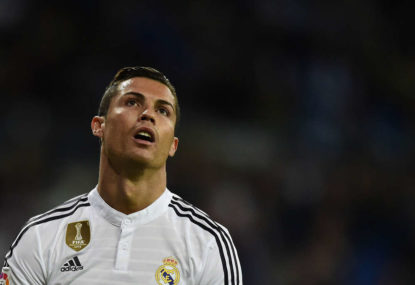Mariners star striker Torres charged with aggravated sexual assault
Central Coast Mariners' star striker Angel Torres has been charged with sexual assault. Torres, 24, was arrested at a property in Terrigal on Monday…

Try this exercise. Take your first and last names, put a ‘the’ in front of them and a ‘brand’ at the end. See if you can say those four words without sounding like a tosser.
Can’t do it, right?
Now read this announcement made last month by the world’s third highest paid athlete.
“I am very excited to announce my latest deal with Mint Media, owned by my good friend, businessman Peter Lim from Singapore, to acquire my image rights. This is a very strategic move for me and my management team to take the Cristiano Ronaldo brand to the next level, especially in Asia.”
Long gone are the days when a pretty boy in knee-high socks with a prodigious kicking ability was simply a footballer. Now he’s a one-man brand.
Of course, Cristiano Ronaldo’s not alone. The world’s best athletes make only a fraction of their dosh actually playing sport.
The one exception is Floyd Mayweather, part-time boxer, serial domestic abuser and the world’s highest paid athlete. No marketing department will touch him with a barge pole. He makes all his money in the ring, on the one or two occasions each year when he deigns to enter it.
At the extreme end of the commoditisation of sport is Fantex Brokerage Services, which has been trading shares in athletes for almost two years. Yep, you can buy a stake in a sports pro. How weird is that?
There’s not a wide choice. Right now, Fantex is offering a portfolio of six NFL players, with Tennessee Titans player Kendall Wright ‘soon to’ list.
Here’s how it works. Players sell a share of their future income to Fantex, which trades it to the public. If you buy shares and the player does well, your investment increases in value. If they turn out to be Ray Rice, you’ve pretty much done your dosh.
OK, so I get that athletes have a limited timeframe in which to make their money. I understand the expression ‘make hay while the sun shines’. I understand that many sports stars have foundations supporting the disadvantaged.
But I started watching sport in the days when John Newcombe’s Cinzano ad, complete with his ‘chin, chin’ sign-off, was about as sophisticated as it got in sports marketing. I started watching sport in the days when the world’s best tennis player did plugs for K-Tel.
So the multi-millions of dollars on offer to those with better hand-eye coordination than the rest of us just seems a bit over the top to me.
And I don’t think I’m alone either. For all the wads of cash washing around the system, how often do we look for the fairytale story in the wider sports narrative? The kind that can be set to the Rocky soundtrack, minus the Harvey High-pants tracky daks perhaps.
Stories like MTN-Qhubeka, the first African team to ride in the Tour de France.
In a sport riven with controversy, here’s a team that rides in the belief that bikes can change lives. That by increasing the distance people can travel, where they can go and how fast they can get there, bikes can give people access to economic opportunity.
And, in that belief, is committed to funding 5,000 bikes for impoverished African communities this year.
MTN-Qhubeka was given a wildcard into this year’s Tour. Meaning little was expected of it.
One of its riders, Daniel Teklehaimanot, nabbed the polka dot jersey for several days. And on Mandela Day, July 18, the birthday of the great South African leader, MTN-Qhubeka won the stage.
Imagine the money they’ll raise through the profile they’ve gained from these Tour de France successes. And how many bikes they’ll buy with it.
To me, that’s the real power of sport.